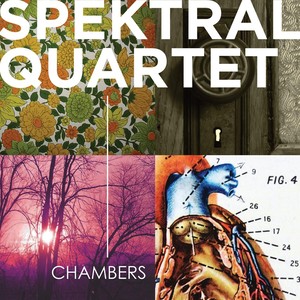
- 歌曲
- 时长
-
作曲家:Hans Thomalla
-
作曲家:Ben Hjertmann
-
作品集:String Quartet No. 2
-
作曲家:Eliza Brown
-
作曲家:Chris Fisher-Lochhead
-
作曲家:Liza White
-
作曲家:Marcos Balter
-
作品集:Chambers
简介
As you take your seat, a chilled glass frosting your fingertips, you notice first that these chairs form a tight circle around the four stands at the center. Instruments are shouldered and the music unfurls. You are in the chamber with Spektral Quartet. It is a place of great intimacy, where eye contact between musician and listener is inevitable. The breath of the players is audible, their furtive exchange of smiles and smirks, unconcealed. The composer is, undoubtedly, sitting nearby. It is an inviting place, a shared space where sound is immersive. Chambers is not a culmination, but an opening salvo from a quartet deeply committed to giving voice to the music written in its lifetime. Each of the six composers on this album is a lynchpin in the Chicago new music scene, and each conjures sound with a distinct and authentic aural vernacular. Hans Thomalla’s exquisite Albumblatt turns delicately like the brittle pages of an old photo album. Within, each of the four voices are released from the far ends of the instrument to align momentarily on microtonally-constructed yet consonant chords, like glimmers of distant memories. Similarly hued by tones outside the 12-note scale, listening to Eliza Brown’s String Quartet No. 1 is like twisting the fine adjustment on a microscope. Delicate textures evaporate into silence and reemerge as the piece accelerates feverishly before detonating into a cathartic C major. Mos Def’s scat, “Zin zin zin zin" on The Roots’ cut “Double Trouble” provides the launch point and title for Liza White’s pugnacious score. Violins, viola and cello here shout this syllable by punching glissandi, each intent on being heard above the fray. Inhabiting a less combative sphere, the volume of dynamic and articulative detail in Chris Fisher-Lochhead’s Dig Absolutely is staggering. Hyper-manicured rhythms on the page translate in the ear to organic shapes before diffusing into incandescent harmonics. Conceived of during a self-imposed caffeine binge, Ben Hjertmann’s Quartet No. 2, Étude demands math-rock precision...with guitar picks. As taut as it is kinetic, Ètude surrounds four virtuosic solos with mixed-meter, unison jams and is responsible for a number of gouge repairs on the Spektral instruments. As the title track, Marcos Balter’s Chambers was initially commissioned to live on a program between Beethoven Op. 18 No. 6 and Bartok String Quartet No.4 in a saturated acoustic. Barely audible whistles weave amongst the mutating textures of the 1st movement while scampering pizzicati and ponticello ascensions lead to whips reminiscent of a record played in reverse for the 2nd. With a nod to Bartók’s symmetrical structures, the final movement frames a bleary, underwater duet with pointillistic canons. -- Doyle Armbrust







